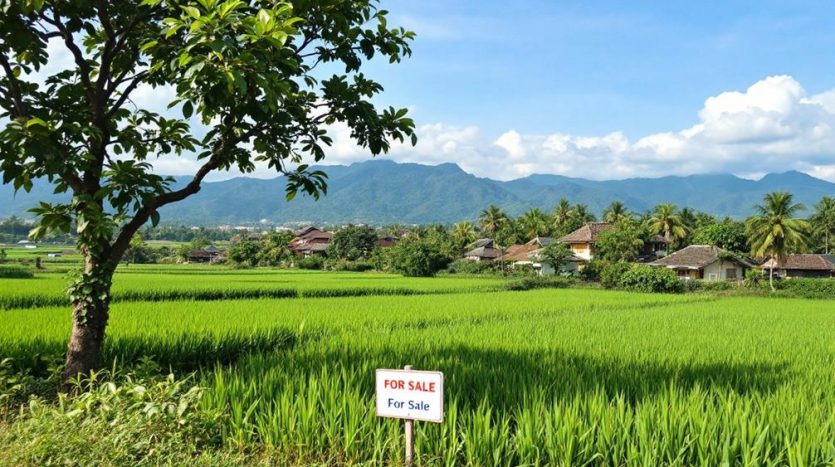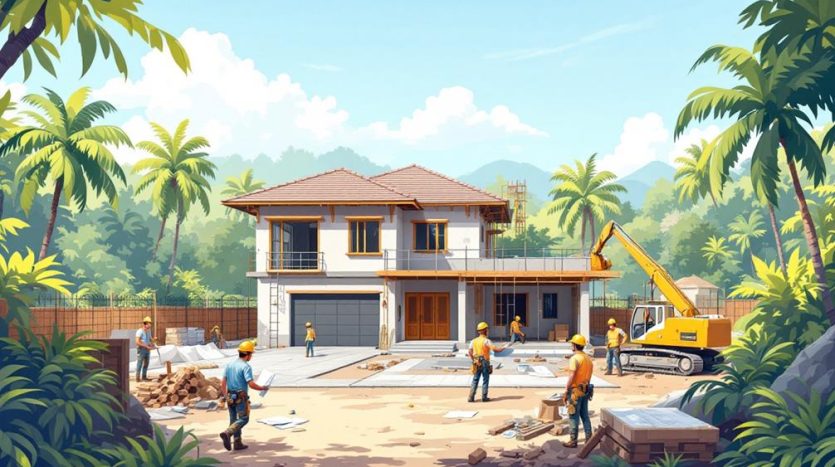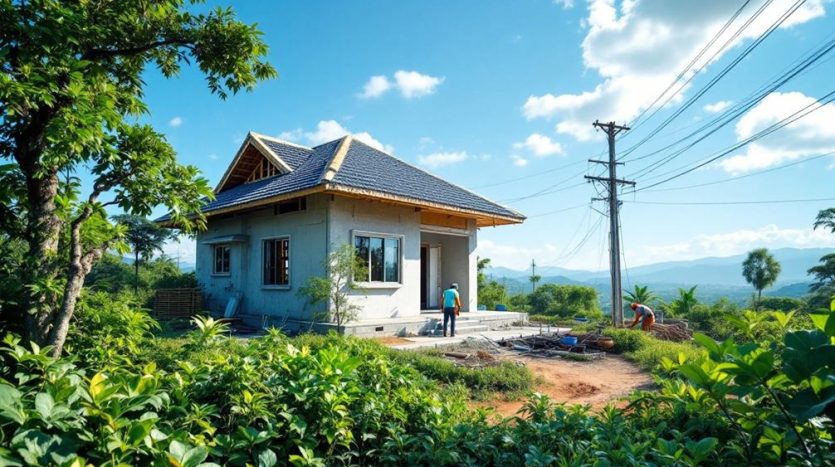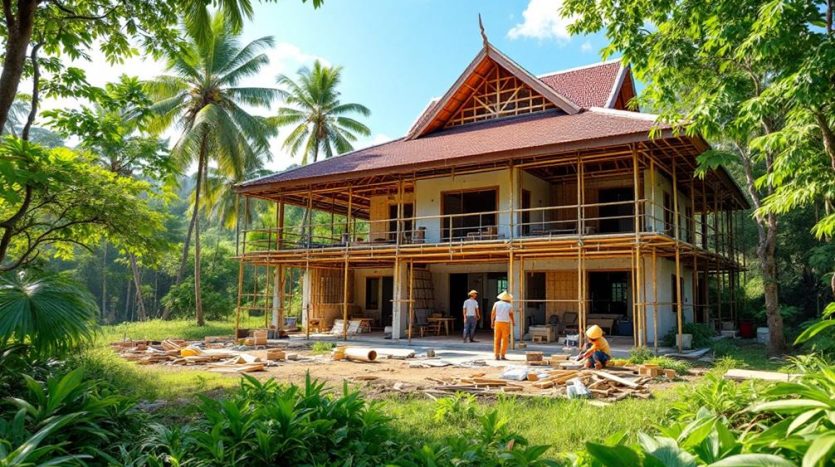How Much Does It Cost to Build a 2 Bedroom House in Thailand?
You might think building a two-bedroom house in Thailand sounds intimidating, but understanding the costs makes it manageable. Start by considering how location greatly affects land prices, with Bangkok being more expensive than Chiang Mai. Then, factor in construction materials and labor—these can shift your budget considerably. Don't forget legal fees and permits, as they're essential for a smooth process. Utilities and infrastructure are also key aspects you'll want to plan for. Curious about interior finishes and landscaping options? There's more to explore, helping you make informed decisions every step of the way.
Key Takeaways
- Urban land prices in Bangkok are significantly higher than in Chiang Mai, affecting overall construction costs.
- Construction material expenses vary based on choice between sustainable and traditional materials.
- Labor costs in Thailand fluctuate based on region, expertise, and economic conditions.
- Legal fees and permitting charges are essential for compliance and avoiding fines.
- Utility setup and infrastructure expenses are influenced by property location and municipal proximity.
Land Acquisition Costs

When considering land acquisition costs for building a 2-bedroom house in Thailand, one must first recognize the significant variance in pricing depending on location. Urban areas like Bangkok can be particularly expensive, with land prices ranging between 200,000 to 500,000 THB per square wah (that's about 4 square meters, if you're wondering). This reflects the high demand and regional amenities available in the capital.
Meanwhile, in quieter regions like Chiang Mai, you might snag a deal closer to 30,000 THB per square wah, offering a more affordable option for land acquisition.
Let's explore the labyrinth of land types and zoning regulations. Thailand offers a smorgasbord of land types: from freehold, leasehold to chanote (the gold standard). Each type comes with its own set of rules, fees, and a dash of bureaucratic red tape.
Zoning regulations add another layer of complexity. You'll need to verify your intended use aligns with local guidelines, lest you find your dream home site relegated to, say, a chicken farm zone.
In essence, maneuvering through these costs is like playing a game of Monopoly—except it's in Thai, and you're not always the banker. Choose wisely, or you might just get sent to (financial) jail.
Construction Material Expenses
Having navigated the intricacies of land acquisition, it's time to break down the costs associated with construction materials for your 2-bedroom house in Thailand. Get ready for some number-crunching fun! First, consider sustainable materials, which are not only eco-friendly but can also save you a baht or two in the long run. Bamboo, recycled steel, and compressed earth blocks are just a few options that tick the sustainability box.
Now, let's dissect the expenses with a handy table:
| Material | Cost (THB) per Unit | Sustainability Factor |
|---|---|---|
| Bamboo | 100 | High |
| Recycled Steel | 200 | Medium |
| Compressed Earth | 150 | High |
| Traditional Cement | 120 | Low |
| Local Wood | 80 | Medium |
You'll want to focus on cost-effective sourcing to stretch your budget further. Local suppliers often offer better deals, so don't be shy about haggling like a pro at the market! Remember, choosing sustainable materials isn't just a trend; it's your secret weapon against climate change—or at least that's what you can tell your friends at dinner parties. Embrace it, and may your wallet thank you later!
Labor and Contractor Fees
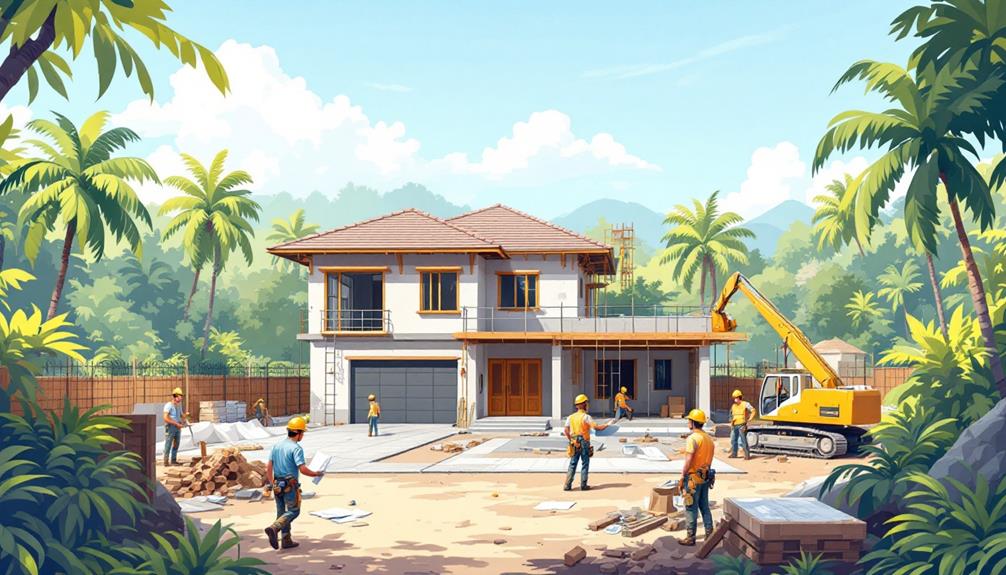
When considering labor and contractor fees in Thailand, you'll find that local labor rates can range from 300 to 600 THB per day, depending on skill level and region.
It's essential to evaluate these rates carefully alongside the contractor selection process. Engaging a knowledgeable real estate agent can be beneficial in navigating local labor markets and guaranteeing fair pricing.
A detailed analysis of past project outcomes, reputation, and pricing transparency will guide your decision. By balancing these factors, you can assure both cost-effectiveness and quality in your construction project.
Local Labor Rates
1. Local Market Trends: Keep an eye on the construction industry's pulse. Wage rates can vary depending on the region.
For example, labor costs in bustling Bangkok might differ from those in a quaint village. It's like comparing a spicy green curry to a mild tom yum—both delightful but distinctly different.
2. Wage Fluctuations: Labor costs aren't static. Economic conditions, seasonal demands, and even public holidays can influence wages.
Imagine labor rates as a tuk-tuk ride; sometimes, they're smooth and predictable, and other times, they zoom in unexpected directions.
3. Skill Level: Skilled workers will likely demand higher pay.
You wouldn't want a novice handling your plumbing, would you? It's worth investing in experienced professionals to avoid any future "leaky" situations.
Contractor Selection Process
Next, plunge into the nitty-gritty of labor costs.
Labor fees can range from 100 to 300 THB per hour, depending on skills and expertise. This variance is enough to make you feel like you're playing construction roulette.
A good contractor should provide a detailed breakdown of these fees, ensuring transparency. If they don't, consider running faster than a gecko on a hot tin roof.
Legal and Permitting Charges
Before breaking ground on your two-bedroom house in Thailand, understanding the legal and permitting charges is essential. You might think maneuvering through the world of zoning regulations and permit applications is like trying to solve a Rubik's Cube blindfolded. But fear not! With a bit of humor and patience, you'll get there.
In Thailand, these costs aren't just a one-line item on your spreadsheet. Let's break it down:
1. Zoning Regulations: First, make sure your plot of land is within the right zoning area. Residential, agricultural, commercial—each comes with its unique set of rules. Ignoring these could turn your dream home into a bureaucratic nightmare.
Be aware that foreign ownership restrictions might also affect your property decisions.
2. Permit Applications: Applying for building permits can feel like filling out an application to join a secret society. You'll need detailed architectural plans, proof of land ownership, and possibly a sacrifice to the paperwork gods (just kidding, but almost!).
Ensuring legal compliance will prevent unexpected terminations or complications.
3. Legal Fees: Engaging a local lawyer to help traverse the labyrinthine legal system might cost a chunk, but it's cheaper than paying fines for non-compliance.
Utility and Infrastructure Setup
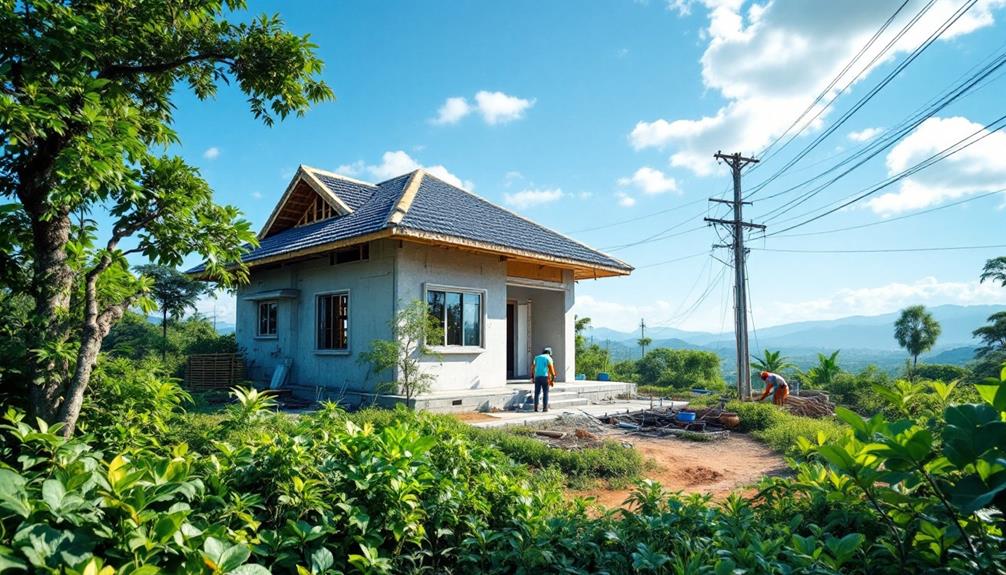
Once you've navigated the maze of legal and permitting charges, the next hurdle is utility and infrastructure setup. You might think you're done with complexities, but surprise! You're just warming up.
Imagine this as the point where your dream home's skeleton gets its essential organs: the electricity, water, and internet connections.
First, let's explore utility pricing. Expect to shell out around 50,000 to 100,000 baht for electricity installation, depending on your location and the mood of the local utility company. Water connections can cost between 5,000 to 20,000 baht, again, depending on your proximity to existing infrastructure.
Keep in mind that regional cost variations can impact these prices considerably, with urban areas generally being more expensive than rural ones. And then there's the internet, the lifeline for Netflix bingers. High-speed connections can range from 1,000 to 3,000 baht monthly.
Infrastructure requirements are another beast altogether. If your plot is in the boonies, you might need to budget for access roads and drainage systems, which can add another 150,000 to 300,000 baht to your expenses.
Pro tip: before you break the bank, check if your plot is within a municipal area where infrastructure is already established. If not, prepare your wallet for a workout. Who knew building a house could also build your financial endurance?
Interior and Landscaping Budget
When planning your interior and landscaping budget for a 2-bedroom house in Thailand, you should allocate approximately 30-40% of the total construction cost to guarantee a comfortable and aesthetically pleasing environment.
Interior design costs can vary greatly, with furniture and appliances potentially comprising up to 50% of this budget.
Additionally, investing in garden and outdoor spaces can enhance property value and may require around 10-15% of your overall budget, depending on design complexity and plant selection.
Interior Design Costs
In planning the interior design costs for a 2-bedroom house in Thailand, you should allocate approximately 15% to 20% of your total construction budget to this category. This guarantees you have enough funds to achieve a stunning interior that screams "I'm well thought out" rather than "I ran out of money."
To keep things stylish yet cost-effective, consider adopting a minimalist design. This approach not only reduces clutter but also saves you a few baht, as less truly is more.
Careful selection of color schemes is critical. Opt for neutral tones that create a harmonious flow throughout your space. This way, you're not left with a house that looks like it was painted by a hyperactive toddler with a rainbow obsession.
Here's a brief breakdown of where your budget might go:
- Wall Finishes: Plan for painting or wallpapering costs. Remember, walls aren't just there to hold up the roof; they're a canvas for your creativity.
- Flooring: Choose durable materials that won't crack under the pressure of your dance moves.
- Lighting: Invest in fixtures that illuminate your home like it's constantly golden hour.
Furniture and Appliances
As you finalize the interior design, it's important to allocate a portion of your budget to furniture and appliances, which typically accounts for 10% to 15% of the total construction costs.
Imagine this: you're standing in your 2-bedroom Thai paradise, but oops, it echoes like a cave because you forgot about the furniture and appliances!
Let's start with furniture styles. Do you fancy the sleek modern look or a traditional Thai style that whispers, "I've got culture"?
Either way, your choice will impact your wallet. Expect to spend anywhere from 30,000 to 60,000 THB per room if you're going for solid quality pieces.
Now, onto appliances. The kitchen might be the heart of your home, but it's got a hefty price tag.
Cooking with gas? Hop on the bandwagon with appliance brands like Samsung or LG, which are known for reliability and slightly less shocking electricity bills.
Your fridge might run you 15,000 to 30,000 THB, while a washing machine could set you back another 10,000 THB.
Don't forget the air conditioning—unless sweating profusely is your new hobby. Allocate 20,000 THB per unit to keep your cool.
Garden and Outdoor Spaces
Envision this: a lush garden and inviting outdoor spaces that not only enhance your home's aesthetic but also increase its value.
In Thailand, where outdoor living is practically a national pastime, investing in your garden is as essential as knowing how to pronounce "Pad Thai."
Here's a breakdown of your sustainable landscaping budget, ensuring your garden's green without making your wallet see red.
1. Plant Selection ($500-$1,500): Opt for native plants. They're cheaper, low-maintenance, and drought-resistant, saving you from becoming a full-time gardener.
Plus, they make you look eco-conscious, which is always in vogue.
2. Irrigation System ($300-$700): Avoid the dreaded dead lawn look with a smart irrigation system.
It's one-time pain for long-term gain, ensuring your outdoor spaces remain lush without you doing a rain dance.
3. Outdoor Furniture ($600-$1,200): Comfort is key in outdoor living.
Invest in durable, weather-resistant furniture. After all, you'll need a throne to survey your kingdom—er, garden.

